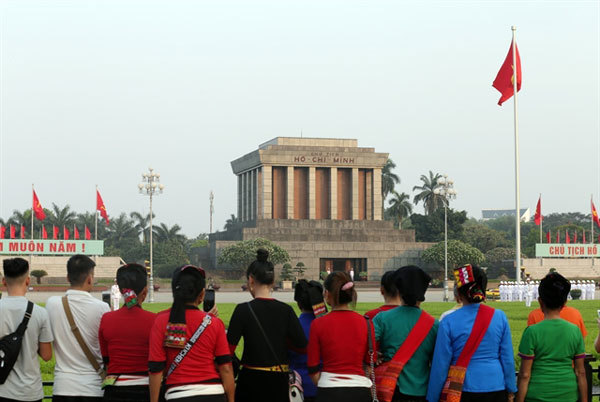Late President Ho Chi Minh’s birth anniversary marked in Spain
New book on late President Ho Chi Minh debuts in Canada
 |
| Ethnic people from remote regions visit and attend the flag raising ceremony at President Ho Chi Minh's Mausoleum in Hanoi. |
Professor Dang Vu Minh, chairman of Viet Nam Union of Science and Technology Associations and president of the 11-member council, said the examination and assessment of the body, which has been preserved for more than five decades, were carried out last week.
The council has also proposed orientations as well as scientific and technical solutions to better preserve and ensure the safety of the President’s body for the long term, said Minh.
Prof. Banin Victor Vasilievich from the Russian Academy of Sciences said the council agreed on the need to step up cooperation between the President Ho Chi Minh Mausoleum’s Management Board and the Moscow biomedical research centre.
The council proposed further improving the procedures to examine and assess President Ho Chi Minh body, using modern scientific methods.
The Russian professor suggested that efforts should be made to improve the training quality of medical workers and technicians involved in the preservation work.
Regular holding of symposiums for Vietnamese and Russian scientists to exchange relevant information should also be considered, he added.
Russian scientists have pledged they will actively work together with their Vietnamese colleagues to perform the task.
Speaking at the meeting, PM Phuc lauded efforts made by the council and thanked the Russian scientists for their support and coordination.
He called on domestic and foreign scientists and the Mausoleum’s Management Board to work closely with each other.
Among the 11 members of the council are four Russian scientists, who are working at the Russian Academy of Sciences, the Russian presidential office’s hospital and Russian scientific research institutes.
After his death on September 2, 1969, the President was embalmed and later placed for viewing at the Ho Chi Minh Mausoleum. The mausoleum was built in two years from 1973 to 1975, with materials donated by people from all over the country.
The Ho Chi Minh Mausoleum is an important landmark of the capital city and is integral to the political and social history of Vietnam.
VNS
 The embalmed body of the late President Ho Chi Minh is in great condition and has been well-preserved, the State-level medical scientific council said during a working session with Prime Minister Nguyen Xuan Phuc in Hanoi on Thursday.
The embalmed body of the late President Ho Chi Minh is in great condition and has been well-preserved, the State-level medical scientific council said during a working session with Prime Minister Nguyen Xuan Phuc in Hanoi on Thursday.